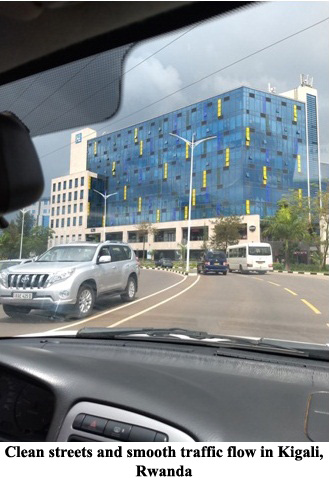 Rwanda has bounced back
from the horrible
tragedy of the
1994 genocide in a
way that would be the envy of other post-conflict countries in Africa.
It has been
hailed as ‘Africa’s Success Story’ and its President Paul Kagame aims
to make it a
showpiece of development and to become ‘the Singapore of Africa.’ Some
Volkswagen cars are assembled in Kigali as well as smart cell phones.
In terms of
the ‘Ease of doing business index’ it jumped in ranking from 143 in
2008 to 29 in
2018. It is also considered the darling of the West and has received
praise from
European and American heads of state and dignitaries and attracts
grants and
foreign aid from bilateral and multilateral sources. Some skeptics have
attributed
this support to guilt, stemming from the failure of the international
community,
especially the UN and the West, to stop the genocide.
Rwanda has bounced back
from the horrible
tragedy of the
1994 genocide in a
way that would be the envy of other post-conflict countries in Africa.
It has been
hailed as ‘Africa’s Success Story’ and its President Paul Kagame aims
to make it a
showpiece of development and to become ‘the Singapore of Africa.’ Some
Volkswagen cars are assembled in Kigali as well as smart cell phones.
In terms of
the ‘Ease of doing business index’ it jumped in ranking from 143 in
2008 to 29 in
2018. It is also considered the darling of the West and has received
praise from
European and American heads of state and dignitaries and attracts
grants and
foreign aid from bilateral and multilateral sources. Some skeptics have
attributed
this support to guilt, stemming from the failure of the international
community,
especially the UN and the West, to stop the genocide.With so many bad stories coming out of Africa, depicting economic collapse; state capture; political instability; corruption, ethnic strife, terrorism and civil wars, Rwanda’s success story is a breath of fresh air. But is this the whole story?
On the plus side, the credits are eye-popping. To name a few: Statistics from the National Institute of Statistics of Rwanda, international organizations and non- governmental organizations confirm the following: Rwanda has the largest number of women in parliament in the world at 62%; It is the fifteenth fastest growing economy in the world with a GDP growth rate of 8%. The country has the largest solar plant in Africa; It has the lowest murder rate in Africa; Kigali is the cleanest city where plastics have been banned and gutters are cleaned several times a day; In 20 years it increased life expectancy from 28 to 67. School attendance is at the highest level ever and graduation rates for primary and secondary schools is at 90%. The literacy rate is 71%. According to a combined UN publication it reduced its maternal mortality rate from 1130 in 1998 to 248 in 2017.
Rwanda’s reputation for its safety, tranquility and sense of security can be felt from the moment of landing in this ‘country of a thousand hills,’ famous for its mountain gorillas. Mining of industrial minerals, gold and sapphire are essential major economic activities with agriculture as a main source of employment for 70% of the population and contributing a third to the GDP. All indicators of health, education and employment show growth in a positive and sustainable direction.
On the negative side, it is still haunted by the horrific genocide of 1994. Its security apparatus is extensive with check points all over the city. Suppression of ethnic identity has become necessary to help transcend the memories of the genocide that took over 800,000 lives. The tragedy of Rwanda is a tragedy of numbers, manipulated by the Belgian colonial masters. Hutus make up 85% of the population of 12 million; Tutsi make up 14% and the Twa 1%. The Belgian colonial regime planted seeds of division by introducing a system of ethnic identity cards in 1926 thereby separating the Tutsi minority from the Hutu majority. They also showed preference for the Tutsi whom they empowered and considered superior to the Hutu. This hostility led to the massacre of the Tutsi and some sympathetic Hutus mainly by the Hutus in 1994, making it one of the worst cases of horizontal genocide in recorded history.
Rwanda also has many social problems. According to the National Institute of Statistics, the poverty rate is still high although it was reduced from 78% in 1984 to 39% in 2014 and is projected to decline to 20% in 2020. Extreme poverty is expected to be eliminated by 2020. The population is a youthful one with 78% under the age of 35 and 43% being under the age of 15. This results in a high child dependency rate of 78%. Prostitution, the oldest profession in the world, is outlawed in Rwanda but operates in a clandestine manner and some of it is linked to poverty. I was told that many prostitutes look like any other women and do not display any exhibitionist signals characteristic of the trade. I was also told that some of the ordinary-looking women who were brought by bikers to certain locations and establishments at night were ‘on the job’ so to speak, but hardly detectable as prostitutes.
According to official statistics and international data bases, teenage pregnancy is a problem and is on the rise from 6.3% in 2010 to 7.3% in 2015.The number of girls who become mothers in their teenage years is 19,000 and child marriage is still practiced resulting in 7% of girls married before the official marriage age of 18 years. However, there is a major governmental stand against teenage pregnancy and child marriage and a determination to end both. The feeling one gets in Rwanda is that there is a strong political will to get things done for the good of the country and the people in a timely and no nonsense manner.
Despite the social problems, Rwanda is a shining example of progress in a post- conflict country. Some credit this success to President Paul Kagame’s leadership ability to unite a divided country after the 1994 genocide. As a guerilla soldier, he brought peace to his country by ending the slaughter and establishing himself as a statesman for all the people, be they Tutsi, Hutu or Twa. One major post-conflict change is the building of one Rwandan identity and the suppression of tribal identity. In fact, identification cards do not indicate ethnicity and the common language Kinyawanda is enthusiastically spoken by everyone. On our briefing background paper for the conference, we were advised not to ask people whether they are Tutsi or Hutu as this would be a throwback to the tragedy of the past. Official statistics show that the majority, about 93%, are Christians of the Catholic faith due mostly to the Belgian colonial influence. About 2% are Muslim. As in many African countries, it can be expected that a number of Rwandans still practice, to some degree, some form of traditional African religion or ancestor reverence of one form or another.
Although Kagame is seen as a savior of his people by ending the genocide, some of his detractors consider him to have despotic proclivities, with an increasing tightening of his grip on power and suppression of any opposition and dissent. A Human Rights Watch World Report of 2019 indicated his complicity in the disappearance and imprisonment of some of his critics and a silencing of opposition to his party, the Rwandan Patriotic Front (RPF.) One of his main opponents is a woman, Diane Rwigara who challenged him as a presidential candidate in 2017. She and her mother were arrested and imprisoned for one year but were later acquitted of charges of inciting insurrection and forgery. She continues her opposition to the Kagame regime as leader of The People Salvation Movement, along with a few other opponents of the government who accuse Kagame of suppression of the opposition.
President Kagame has denied these accusations by his critics and prefers to value the opinion of the vast majority of Rwandans who strongly support him. He was voted in for a third term in 2017 by 98.8.% of the population through a change in the constitution by a referendum allowing him to run for a third term and potentially for future elections. One of his signature claims to success is his absolute and unflinching support for gender equality and women’s rights and advancement, which explains in part their high representation in parliament at 62%. In addition, 50% of cabinet ministers are women as well as 44% of the judicial officials. Women also hold high positions in other departments and organizations in the country and gender pay equity is the norm. Rwanda is considered to be the 5th best place to be a woman in the world.
Speaking of women, I went to Rwanda to
present one of the major
speeches at
the third international conference on Women’s Leaders in Global Health
from
November 9 to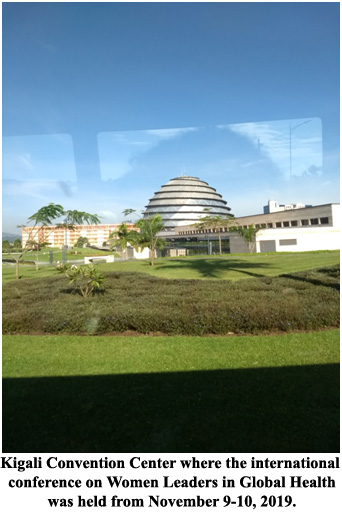 10, 2019 in Kigali. The
conference was attended by well
over 1000
delegates of which 657 were from Africa. In all 81 countries were
represented.
The first lady of Rwanda, Mrs. Jeannette Kagame gave the formal opening
address
and H.R.H. Princess Dina Mired of Jordan, Director-General of the King
Hussain
Cancer Foundation gave a keynote address. Most of the participants were
physicians or professionals working in the field of health as well as
lawyers,
academics, donor agencies, international organizations, ambassadors and
administrators. The conference had many sponsors and was organized by
the
University of Global Equity based in Rwanda and its vice Chancellor,
Dr. Agnes
Binagwaho, former Minister of Health of Rwanda and several planning
committees. The conference made sure that men were included in all of
the
panels in an effort to build alliances with men in promoting women’s
leadership in
Global Health.
10, 2019 in Kigali. The
conference was attended by well
over 1000
delegates of which 657 were from Africa. In all 81 countries were
represented.
The first lady of Rwanda, Mrs. Jeannette Kagame gave the formal opening
address
and H.R.H. Princess Dina Mired of Jordan, Director-General of the King
Hussain
Cancer Foundation gave a keynote address. Most of the participants were
physicians or professionals working in the field of health as well as
lawyers,
academics, donor agencies, international organizations, ambassadors and
administrators. The conference had many sponsors and was organized by
the
University of Global Equity based in Rwanda and its vice Chancellor,
Dr. Agnes
Binagwaho, former Minister of Health of Rwanda and several planning
committees. The conference made sure that men were included in all of
the
panels in an effort to build alliances with men in promoting women’s
leadership in
Global Health.
 10, 2019 in Kigali. The
conference was attended by well
over 1000
delegates of which 657 were from Africa. In all 81 countries were
represented.
The first lady of Rwanda, Mrs. Jeannette Kagame gave the formal opening
address
and H.R.H. Princess Dina Mired of Jordan, Director-General of the King
Hussain
Cancer Foundation gave a keynote address. Most of the participants were
physicians or professionals working in the field of health as well as
lawyers,
academics, donor agencies, international organizations, ambassadors and
administrators. The conference had many sponsors and was organized by
the
University of Global Equity based in Rwanda and its vice Chancellor,
Dr. Agnes
Binagwaho, former Minister of Health of Rwanda and several planning
committees. The conference made sure that men were included in all of
the
panels in an effort to build alliances with men in promoting women’s
leadership in
Global Health.
10, 2019 in Kigali. The
conference was attended by well
over 1000
delegates of which 657 were from Africa. In all 81 countries were
represented.
The first lady of Rwanda, Mrs. Jeannette Kagame gave the formal opening
address
and H.R.H. Princess Dina Mired of Jordan, Director-General of the King
Hussain
Cancer Foundation gave a keynote address. Most of the participants were
physicians or professionals working in the field of health as well as
lawyers,
academics, donor agencies, international organizations, ambassadors and
administrators. The conference had many sponsors and was organized by
the
University of Global Equity based in Rwanda and its vice Chancellor,
Dr. Agnes
Binagwaho, former Minister of Health of Rwanda and several planning
committees. The conference made sure that men were included in all of
the
panels in an effort to build alliances with men in promoting women’s
leadership in
Global Health.
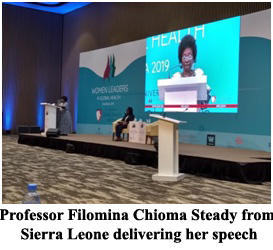
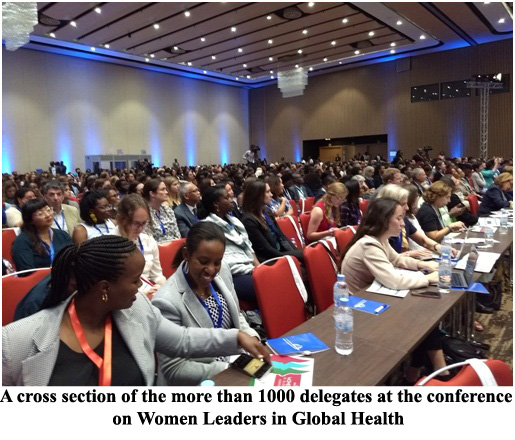 My presentation was titled: ‘What
we have learned in the health sector
from women's leadership in African history.’ It was followed
by
several panels over a period of two days dealing with issues of the
slow pace of women’s
leadership in the field of heath; policy formulation and implementation
in the health
sector; challenges of access to health care services for women;
gender-based discrimination in the health sector; maintaining family
and career
balance; risks to women’s health from environmental changes and
climate
change; spotlight
on cancer, adolescent health; gender-based violence; workplace sexual
harassment and progress made in women’s leadership in health since the
Beijing
conference.
My presentation was titled: ‘What
we have learned in the health sector
from women's leadership in African history.’ It was followed
by
several panels over a period of two days dealing with issues of the
slow pace of women’s
leadership in the field of heath; policy formulation and implementation
in the health
sector; challenges of access to health care services for women;
gender-based discrimination in the health sector; maintaining family
and career
balance; risks to women’s health from environmental changes and
climate
change; spotlight
on cancer, adolescent health; gender-based violence; workplace sexual
harassment and progress made in women’s leadership in health since the
Beijing
conference.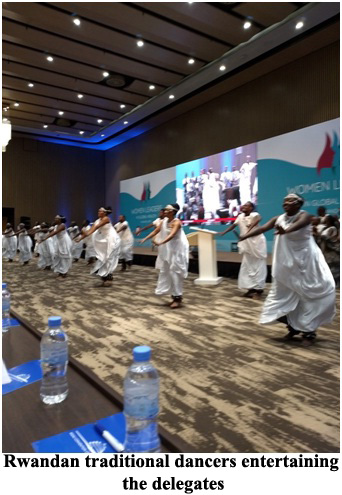
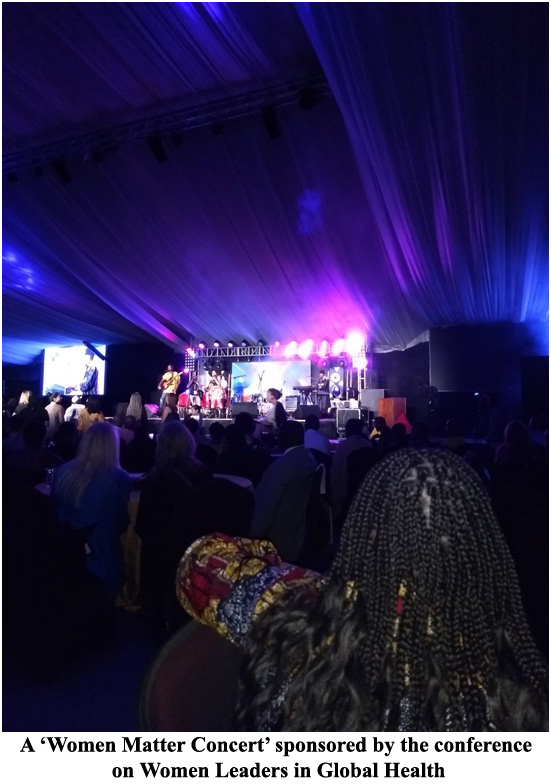 Lively discussions followed each
panel and plenary session including
the difficulties of women obtaining research grants; creating the right
policy and enabling environment for women’s health;
cultural barriers
to women’s
health in Africa; the inadequacy of medical systems in Africa and
mentoring of
youth in the health sector. The perception of men as the main bread
winners and therefore deserving some advantages
was challenged as more women are
becoming
heads of households at the rate of 35% and higher in some countries.
Discussions on sexual harassment and assault received much agitated
attention. It was
generally agreed that the enforcement of zero tolerance policies
against sexual
harassment, gender -based violence and sexual assault are imperative
and long
overdue. The conference ended with a ten-point call to action that will
improve
women’s health outcomes and promote female leadership in all
institutions and
at all levels of the health sector!
Lively discussions followed each
panel and plenary session including
the difficulties of women obtaining research grants; creating the right
policy and enabling environment for women’s health;
cultural barriers
to women’s
health in Africa; the inadequacy of medical systems in Africa and
mentoring of
youth in the health sector. The perception of men as the main bread
winners and therefore deserving some advantages
was challenged as more women are
becoming
heads of households at the rate of 35% and higher in some countries.
Discussions on sexual harassment and assault received much agitated
attention. It was
generally agreed that the enforcement of zero tolerance policies
against sexual
harassment, gender -based violence and sexual assault are imperative
and long
overdue. The conference ended with a ten-point call to action that will
improve
women’s health outcomes and promote female leadership in all
institutions and
at all levels of the health sector!I was able to speak with a number of Rwandans and non-Rwandans about their opinions of the country and its progress and prospects for the future. In general, the views were positive and people were upbeat and optimistic about the future. However, many of the conversations with Rwandans were guarded, partly because we had been advised not to ask sensitive questions, especially about ethnicity. I barely got any criticisms beyond the mild feeling of not being able to speak freely. Someone joked that ‘there may be spies listening.’ A few mentioned the high taxes, reaching about 40% in some cases, but were satisfied with the improvements that are made possible by the taxes. Many of them are proud of the progress they have made and feel secure and confident that the horrors of the past are behind them.
One major problem, characteristic of Belgian colonial rule and also evident in the Democratic Republic of the Congo, is the failure of the Belgians to educate a large professional class of Rwandans. I was informed that this may have resulted in some of the middle and top management and professional positions being filled by non- Rwandans, particularly from other parts of Africa, primarily East Africa. This is also partly attributable to the fact that Rwanda is a member of the East African Community which promotes political, economic and other forms of collaboration in the sub-region.
Rwandans are friendly and helpful and many of them are tall and slim. Although I was told that there are some well-proportioned (or fat) ones, I only saw a handful. This could be explained by the fact that their staple diet is high in vegetables and low in animal proteins and fats. I had lunch with some newly-made friends at ‘The Hut,’ a popular restaurant in Kigali that serves all kinds of international and local dishes. I decided to try the local pounded maize with grilled fish and a delicious local sauce. It was quite a treat! This was followed by passion fruit made into a custard-type of dessert and the local beer. One striking feature about this restaurant is that it was on the only dirt road that I saw in Kigali and some of the fencing next to it was made of corrugated iron sheets. That was one of the few times that reminded me of Freetown, which has many dirt roads and fences as well as small buildings made of corrugated iron sheets in the city. Another was my visit to the large city market which retails just about everything but, unlike Kissy Road Market and other markets in Freetown, this city market is completely enclosed. Almost all trading is done in markets, supermarkets and malls in Kigali and not on the streets.
However, there were some things that were missing in this land- locked country which are abundant in Freetown. First, the beautiful beaches stretching for miles on the coastline of the Sierra Leone peninsular. Second, The Port of Freetown, regarded as Africa’s largest natural harbor. Third, the colorful local attire that comes in a variety of styles and accessories and worn by women every day and everywhere. Fourth, the extensive and rich West African cuisine, including its famous Jollof rice. Finally, the vibrant and ever present cultural traditions and rituals found in the music, dances, visual and performance arts throughout West Africa.
Rwanda raises the issue of the role of democracy in Africa and whether or not a ‘benevolent dictator’ with a progressive vision that will strive to lift all people from poverty and promote development and peace is not what Africa really needs. Kagame himself has argued that democracy has to be appropriate and localized to be relevant and effective in Africa. He sometime says: ‘We don’t follow rules. We follow choices.’
One party states dominated the immediate post-independence scene using the argument that constructive opposition is most effective within the party than outside of it. However, these types of one party states left many countries in a state of underdevelopment and the continent has been plagued with civil strife, rebel wars and military coups, following the establishment of so-called democratic regimes. Opposition is the hallmark of democracy as well as restraint. However, the African political culture has a penchant for destructive opposition and an appetite for authoritarianism and intolerance of dissent. Rwanda is technically not a one party state but the regime and its agenda have the support of 98.8% of the population and progress is demonstrably being made at all levels.
The question then is this: Should Africans accept ‘benevolent dictatorships,’ if under such systems, economic and social development and improvement in the lives of all the people will be guaranteed? How can we establish sustainable political, economic and social institutions under so called democratic systems if most of them are failing and not living up to expectations all over Africa? Maybe it is time for Africa to rethink the Westminster model of parliamentary democracy and party politics and look for more creative and indigenous alternatives partly based on African traditions of consensus building. The following examples come to mind: The Gacaca court system of community justice in Rwanda; direct democracy practiced in village councils and ‘talking houses’ designed to settle disputes.
We may also want to look at other countries that have combined some elements of dictatorship while allowing democratic spaces to flourish and promoting socio- economic development, like historic Singapore or the ‘democratic socialism’ model of Scandinavian countries. For now, it seems as if the choice for Africa is between authoritarian rulers and destructive party politics, disguised as ‘democracy’, or so called ‘benevolent dictatorship’ that seeks to promote equality, development, peace, justice and a decent standard of living for all its people. After visiting Rwanda, I am leaning towards the so -called ‘benevolent dictatorship’ of the Paul Kagame variety in which people have come to value themselves and others, and to respect a leader that executes a plan to take his country to a higher level, without leaving anyone behind.
However, a succession plan must be in place and the building of strong and effective institutions must be continued to sustain the gains made so far. Significantly, political spaces must be opened and accessible to facilitate constructive opposition without real or imaginary intimidation.
Congratulations Rwanda!!!